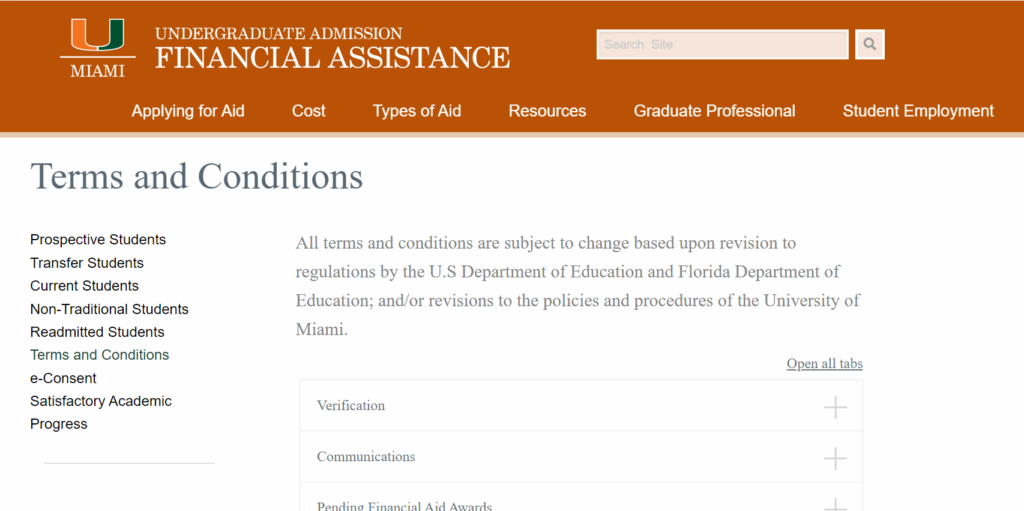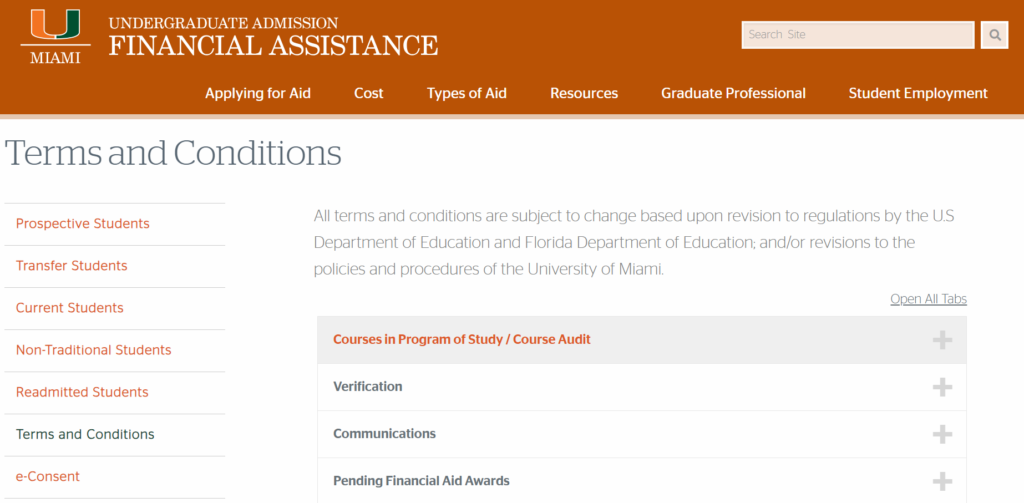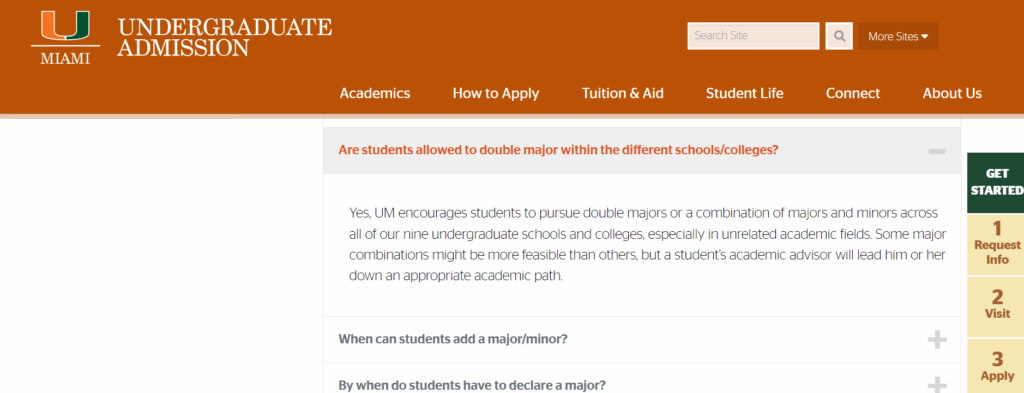The University of Miami first warned Sophia Plancich that she was in violation of the University’s financial aid policies on the morning of March 6. Plancich, who is a first semester senior double majoring in international studies and ecosystem sciences, was told five of her ECS classes are not in her program of study.
She was one of many to receive such an email, sent out by UM to students who could have been impacted by “FACA,” which stands for Financial Aid Course Audit.
“As part of our commitment to your success, we regularly review student academic records and financial aid packages to ensure alignment with degree requirements and institutional policies,” the email read. “In keeping with our policies and the terms under which financial aid is awarded, it is crucial that students enroll in courses directly contributing to their degree completion,” it continued.
Plancich was confused. She thought she was within the University’s requirements because she had never received an email claiming otherwise. Since last spring, she had pursued her second major of ECS and met the GPA and credit minimums mandated in the University’s federal aid requirements.
“This must be a mistake. Like, those are degree requirements for me,” she replied to the email.
In a separate email, not sent to Plancich, but instead students in the Marine & Atmospheric Science Program, the department indicated that “UM will be launching a new program called Financial Aid Course Audit” and that “students will have to fulfill certain requirements to remain eligible for financial assistance.”
The email Plancich received made no mention of a new FACA program aside from using “Financial Aid Course Audit” as the subject line. Instead, the email alludes that she should have known students must “enroll in courses directly contributing to their degree completion” to receive financial assistance.
“For this semester, we are issuing a warning only,” it reads in bolded text. “Starting with the next academic term, financial aid adjustments will be implemented for enrollment in courses not required by your degree program.”
The policy in question can be found on UM’s online “Terms and Conditions” of financial assistance page. Near the top, there is a tab titled “Courses in Program of Study / Course Audit,” which now reports that students who pursue minors or second majors may not receive federal or state aid for the courses that are not needed for their primary degree. That is a rule set by the federal government that UM must comply with.
Discrepancies in the policy
Yet, as recently as March 3, three days before she received her warning, UM’s published “Terms and Conditions” of financial assistance made zero mentions of this policy.


In fact, on another UM page, the University encourages prospective students to “pursue double majors or a combination of majors and minors across all of our nine undergraduate schools and colleges, especially in unrelated academic fields,” with no reference to this federal aid policy.

Plancich, who has now pursued her ECS major for a year, should have received a notification from the school that she was not in compliance with federal policy a year ago, when she began taking courses outside of her primary international studies major.
She could still pursue the remainder of her second major, but would not be able to use federal or state aid to help pay for it.
Conflicting messages
The situation became even more confusing for Plancich when she reached out to the school for clarification. In a reply following the initial warning, Daniel Barkowitz, the assistant VP of Financial Assistance and Employment, informed her that “financial aid” would not cover courses outside of her first degree of international studies.
When she contacted ‘Canes Central, UM’s student services provider, they told her this policy would not affect her because it only applies to “double degrees” not “double majors.” Another of her advisors shared that they had heard a variety of conclusions from different students.
The Miami Hurricane contacted Barkowitz three times over the course of a week regarding the University’s financial assistance policy but received no response.
Plancich shared that she was still unsure whether she could continue taking her ECS major.
“I think that it is so incredibly unfair, especially just the timeline of it, the inconsistency in communication and having young people make decisions that would impact their ultimate careers and future because of an institutional change that they can’t do anything about,” Plancich said.
UM provided a statement to The Miami Hurricane indicating that their published policy, which now complies with U.S. federal policy, only applies to students receiving state or federal aid.
“Courses taken outside of the degree requirements will not count for establishing a student’s enrollment status for federal or state financial aid, and will not be considered in payment of federal or state financial aid, including scholarships, grants, loans, and work study,” UM said. “Students who pursue minors or second majors should be aware that this restriction applies to courses not needed for their primary degree and therefore may impact their federal or state aid as well.”
An old policy only enforced now
Based on a definition of “Undergraduate student” put forth by the Department of Education in 2007 and buried in title 34, section 668.2 of the Code of Federal Regulations, the student must be “enrolled in an undergraduate course of study that usually does not exceed four academic years,” or “enrolled in a longer program designed to lead to a first degree at the baccalaureate level.”
At UM, the “course of study” part of the definition refers to the schedule outlined in UM’s academic bulletin. When a student fulfills all of the 120 credits allotted in their degree’s academic bulletin program, their courses are no longer eligible for federal or state aid.
A typical UM student takes 15 credits, usually equivalent to five classes, per semester, for eight semesters. If the student starts at zero credits and follows that schedule, they will exactly fulfill their degree’s requirements. But, not all students follow that mold. A student may take more than five classes per semester, complete credits during the summer term or receive college credits in high school.
For Daniel, a junior majoring in microbiology and immunology who preferred to only go by his middle name, he was able to complete the 103 credits required by his major in three years, instead of four. Daniel plans to graduate early, but he could have pursued a second major in his fourth year. If he had, he would have discovered from UM on March 6 that federal aid will no longer cover his studies.
“I’m not allowed to explore or enrich my knowledge outside my major, or, if I choose to, I’ll be fined with a very massive bill that UM expects me to pay,” Daniel said.
Using data provided by the Department of Education and by a study conducted at UM in 2020, the Hurricane estimates that about 10% of UM students receive federal aid and are pursuing two majors. The Hurricane can not verify this estimate, but hopes the estimate provides more context to readers. Read more below.
“If a student has questions about their particular circumstance, they should start by reaching out to their academic advisor,” UM said in their statement to the Hurricane.
Statistical reasoning: In 2020, a group of researchers concluded that about 32% of UM undergraduates are pursuing a double major. They were working on a paper regarding the digital humanities and surveyed 301 UM undergraduates. We then used the Department of Education’s report that 33% of UM students received federal aid in 2020. With the assumption that receiving federal aid is independent from the decision to pursue a double major, we can estimate that 10.6% of students in 2020 were double majors who received federal aid. Unfortunately, this estimate does not recognize the undergraduates that receive state aid.







